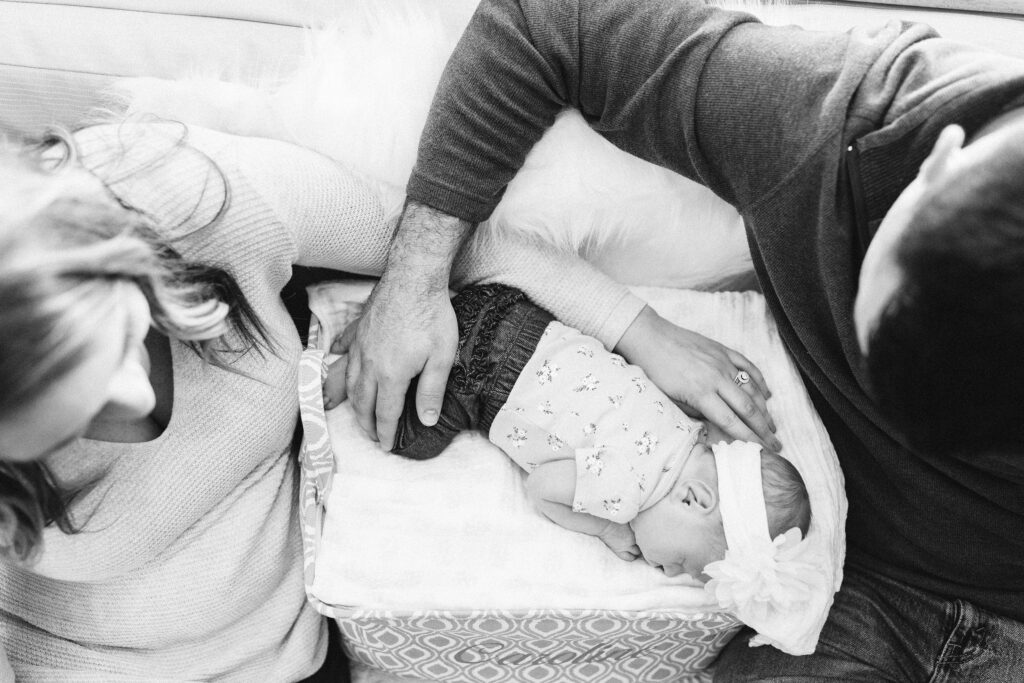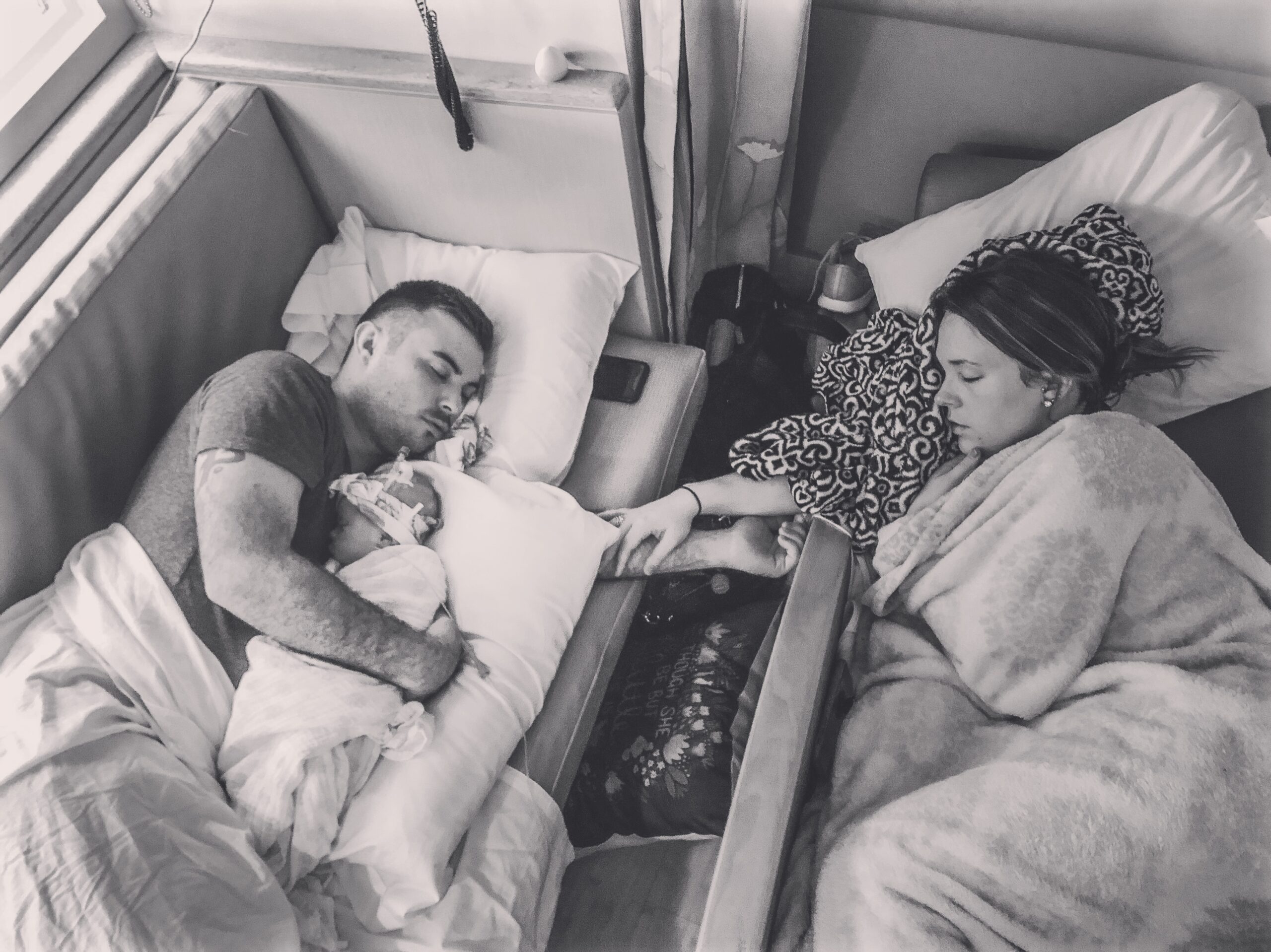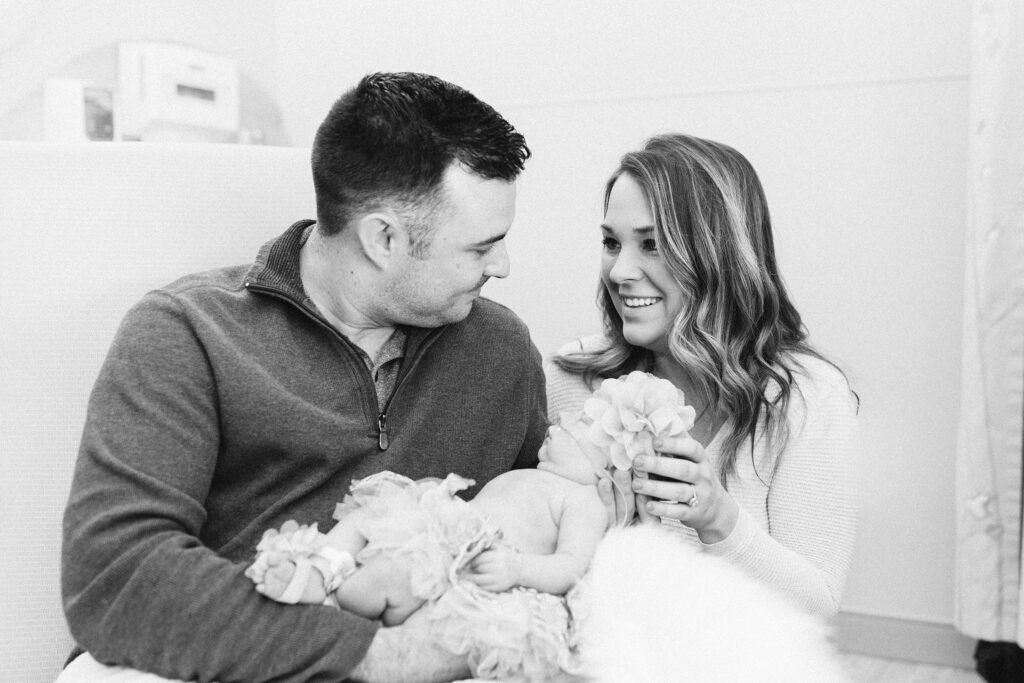
Name: Danielle Biddy
Location: Georgia, United States
Child’s Birth Year: 2019
Keywords: Loss Parent, PTSD & Mental Health After HIE, Pregnancy After HIE, Advocacy Work/Blogging, Work in Medical Field
When Danielle and Matt found out they were expecting, they were ecstatic. Going strong on two years of marriage, they just knew they had more love to share. Not only would Caroline be their first child, but she would be the first grandchild as well for Danielle’s parents.
For the most part, pregnancy was simply a time marked by joy and anticipation. There were no major complications, and Danielle and Matt were ready to start this new chapter of their life, envisioning heartfelt memories, such as morning cuddles with Caroline or watching her take her first steps. At around thirty-seven weeks into her pregnancy, when Danielle went to the OB/GYN for decreased fetal movement, she was reassured that Caroline’s heartbeat was strong and all was fine. As Danielle went into labor around two weeks later, that amazing, happy future she envisioned with Caroline remained intact. But these vivid images Danielle had conjured in her mind would not manifest into reality.
The first sign of trouble was when Danielle went to the hospital for delivery. The physicians discovered that Caroline’s heart rate was not reactive. That day, March 9, 2019, Danielle had an emergency C-section. Caroline was born in critical condition. She needed immediate assistance for breathing, and she essentially had no muscle control whatsoever, needing to be transferred to a hospital with a higher-level NICU. Danielle, exhausted physically from the surgery and mentally from the surreal turn of events, recovered in the hospital where she’d delivered before she could be with Caroline. That vision Danielle had of holding Caroline tightly in her arms, Matt leaning over the bedside, seemed infinitely far away. More than anything, Danielle just wanted to embrace her daughter and let her know that everything would be okay—it was them against the world. But she couldn’t do that and didn’t get those typical post-birth memories. Her heart completely broke.
Caroline stayed in the NICU for around seventy days. The doctors determined that her hypoxic ischemic injury probably happened around ten to fourteen days before the delivery, so unfortunately, the window for cooling was long gone. After Caroline received multiple EEGs and MRIs, the worst-case scenario seemed to be unfolding. Danielle and Matt were informed that Caroline’s HIE fell on the severe end of severe. Caroline had no suck and swallow reflex, zero muscle control, and the doctors said she probably wasn’t able to see or hear. Around two months into the NICU stay, Caroline was still reliant on oxygen support, and her condition didn’t seem to be improving.
On the morning of May 5, 2019, Danielle and Matt made the unbelievably difficult decision to leave the feeding support but take Caroline off oxygen. They anticipated Caroline would pass away, but, instead, she began breathing on her own. No one really knew what was going on, and, after a few days, Caroline’s blood gas levels were completely within the normal range—it seemed like a miracle.
Danielle and Matt knew it wasn’t the type of miracle where Caroline was magically better, since her health was still very impacted. But it was the type of miracle where they would have more time to spend with her, however long that might be.
Knowing that time is precious, and well-aware that life can change in an instant, Danielle and Matt didn’t want to waste the time they had left with Caroline stuck in the confines of a hospital. Instead, they decided to take their beautiful baby daughter home and enjoy the story and timeline that Caroline was writing for herself.
Before going home, Caroline was transferred to yet another hospital in Atlanta to undergo G-tube surgery. Danielle and Matt figured this would be the best option, so they wouldn’t have to worry about tubes coming out for her feedings at home, among other things. Caroline was discharged right after Memorial Day weekend with hospice services, and she was able to spend ten precious days at home with her parents before passing away on June 9, 2019.
During those ten brief, but meaningful, days, Danielle tried to focus on taking it moment by moment instead of worrying about what the future. Caroline was a sick baby, but she was so much more than that…she was Danielle’s sassy little diva, not afraid to express outright what she liked and what she didn’t like. Caroline would tell Danielle that she didn’t like her feet touched but loved her head being stroked. In a sense, she had a remarkable ability to speak her mind without actually speaking. Danielle had felt deeply connected to Caroline during her pregnancy, but, when Caroline was first born, Danielle felt like she didn’t know who her daughter was anymore. Being out of the hospital environment, Danielle was finally able to reconnect with Caroline by not letting her own fears stop Caroline from experiencing the world around her. For instance, Danielle and Matt were able to enjoy taking Caroline to the farmers’ market on a beautiful summer day, as well as outings to Costco.
Toward the end of her time at home, Caroline started showing signs of weakness and fatigue—her way of expressing that it was her time. Eventually, Caroline had a bad reaction to medication that caused her to stop breathing. Caroline was intubated and taken back to the hospital. Danielle and Matt had always said that, while they would pray for a miracle, it would not be a miracle to leave her hooked up to machines her entire life. Exactly three months after Caroline was born, she was extubated and passed away that same day.
Throughout Caroline’s life, Danielle was very vulnerable about her experiences and open to sharing their HIE journey on social media platforms, such as Facebook and Instagram. Danielle’s decision to create a public diary of sorts was inspired by the mother of one of Matt’s friends. In the early days after Caroline was born, this mother told Danielle that, during her husband’s battle with cancer, she learned that people are innately drawn to tragedy, similar to how drivers slow down to glance when passing the scene of a car wreck. This really resonated with Danielle, and she decided that, if people were going to wonder about Caroline, she might as well use her platform to be the light for the observers. She also posted as a way to allow people to pray for Caroline, no matter what was going to happen. While Caroline was still alive, Danielle gained a large number of followers. She was able to use her Instagram as both a catharsis and to connect with many amazing people, fellow HIE parents included. Danielle has always called it this a “club that no one ever wants to be a part of,” but which is a wonderful community nonetheless.
This entire journey has opened her eyes up to how incredibly kind human beings can be. At Caroline’s funeral, for instance, almost 500 family members, friends, and supporters from this “club” attended to honor Caroline’s memory. In the hardest days of Danielle’s life, people showed up for her in more ways than she could have ever imagined, and, for that, she will forever be grateful. Danielle will also always remember the NICU nurses who made a hospital room feel a little more like home, showing unconditional support, spending hours in the night rocking Caroline to sleep when Danielle and Matt needed to get some rest themselves. Through setting up experiences, such as a newborn photo shoot or helping Danielle and Matt take Caroline outside, they helped Danielle and Matt feel like “real” parents, by treating Caroline like a baby instead of merely a medical case.
In the wake of Caroline’s death, Danielle and Matt have experienced what no one should ever have to endure—being parents without a child. Danielle still vividly remembers the day she left the hospital without Caroline in her arms, returning to a house that no longer felt like home. She remembers the way Caroline’s toys just sat there, so still, with no one to enjoy them. She remembers the nights where she sat awake, pumping breast milk for a baby who was no longer with her. In those months, every bone in her body physically ached to embrace Caroline’s broken little body once more. When she scrolled through the Hope for HIE page, Danielle’s version of hope didn’t quite match that of many others—how could she find hope in the inchstones, when Caroline was no longer here? In the times when it seemed like the void in her heart would never be full again, she listened to a different, yet immutably present, voice of hope—hope that Caroline was no longer suffering, that Caroline’s short life held meaning and purpose, and that Danielle would one day have a life after loss, finding her way back to happiness.
As an occupational therapist who works with children with disabilities, Danielle understood that Caroline’s injuries were too extensive to even get to the point where therapy was an option. Thus, part of Danielle’s hope meant viewing the situation as not Caroline transitioning from life to death, but Caroline transitioning from a world in which she was suffering to a world in which she was finally healed, whole, happy, and at peace. While she is not thankful that her first child is no longer here—knowing you have all this love to give and no baby to give it to is beyond devastating—there is relief that comes with knowing that Caroline no longer needs to fight in agony just to survive another day.
About a year after Caroline’s death, Danielle became pregnant with her second child. Pregnancy with her “rainbow baby,” Jace, was definitely a complicated time. Never did Danielle imagine she could feel such intense joy, yet grief, at the same time. After months of trying for another child, she would no longer carry the role of a mother without a child. Jace means “healer,” and, although she and Matt didn’t expect for Jace to suddenly “fix” them—that type of pressure would be too much of a burden for any child to bear—she viewed him as her miracle baby, a way to carry on Caroline’s legacy.
However, Danielle also found herself grieving the unanticipated secondary losses. She grieved the loss of the naïveté of just being happy and hopeful during pregnancy, instead constantly worrying that things would go wrong. She grieved the loss of waiting in anticipation for her due date to arrive, since she would be getting a C-section with Jace instead of having a vaginal delivery. And, most of all, she grieved the loss of Jace getting to meet his wonderful older sister. When Danielle experienced this grief, she often felt guilty, beating herself up over not being grateful for this second chance at motherhood. Danielle wants HIE parents to know that it is okay to feel all the emotions, even if that means feeling weak or sad at times. Without acknowledging and validating those emotions, it’s impossible to work through them. In addition, it’s okay if grief isn’t linear—like most things in life, it never will be. There were days when Danielle felt like she was drowning in a sea of trauma and despair, and other days where she could look back at pictures of Caroline and smile at the memories. Both ways of living and feeling are okay, and she has learned to give herself grace, regardless of where she lies on that spectrum of grief.
During the pregnancy with Jace, there was one instance when Danielle thought she might be having contractions. She went in for a check-up just to be safe. She apologized to the doctor, saying she didn’t mean to be dramatic, but just wanted to make sure nothing was wrong, given Caroline’s history. She really appreciated how the doctor responded with validation and compassion: “There is no need to apologize. Even if that hadn’t happened to you, it would be completely normal for you to come in for something like this.” That act of simply validating Danielle’s concerns made a world of difference and helped her feel better about advocating for her child. Danielle hopes expecting mothers know it’s okay to feel anxious, and encourages physicians to openly validate new moms, who might be more anxious, even if that fear of not wanting to feel like a burden is internalized. Through this encouragement, perhaps expecting mothers will be more willing to seek help if something feels “off” in the pregnancy, which could lead to catching a potential complication early on.
In spite of all her worries, Jace was born without any complications in late February of 2021. It has certainly been a bittersweet journey watching Jace grow up, but Danielle has become so much more appreciative of every moment and every day with Jace. For a long time after Caroline’s death, Danielle didn’t think it would ever be possible to find happiness again. But now, as she sees Jace’s crooked, goofy smile, or starts to see little glimmers of his personality shine through, she feels some of the wounds in her heart beginning to close back up. Her heart may never fully be healed, and, even if there are strokes of sadness painted into the good, that doesn’t mean life isn’t still good…the definition of what constitutes a good life has just evolved. Danielle’s good life is no longer that dream she had of toddler Caroline swooning over Jace in her “World’s Best Big Sister” shirt. Now, her good life is just being present with Jace and loving him unconditionally, all while holding onto the faith that her Sweet Caroline is looking down on them, knowing how deeply she is adored. Her good life means being vulnerable about her experiences with the hope of supporting other parents grieving the loss, or potential loss, of a child. Her good life means living the life Caroline would have wanted for her, one where gratitude and faith resonates more than anger and sadness. Her good life means trying to be that light for people in dark situations.
Danielle couldn’t have landed on her modified “good life” without the immense support and kindness of those around her. One major thing she learned throughout this journey was that accepting help is not a sign of weakness but actually a sign of strength. She remembers once when she was in the hospital, and her dad asked if he could bring her a warm meal. She told him, no, that she was fine. But his response is something that really helped transform her mindset: “Danielle, bringing you this food is a blessing for me. Please let me do it.” This interaction helped her realize that it was completely okay to accept help, and that, in doing so, she was, in turn, helping those who loved her feel less helpless. Thus, she wants other parents to know that, in a journey as daunting and terrifying as that with HIE, reach out for support and let others help you. Don’t feel like you have to go through this alone. Whether it is connecting with people through Hope for HIE who understand the uncertainty and worry concomitant with this journey, leaning on a partner, or attending grief share groups, find your community of people. Join that club that no one ever wants to be a part of, but which is made up of amazing members who will welcome you with open arms and hearts.



Connect with families, read inspiring stories, and get helpful resources delivered right to your inbox.